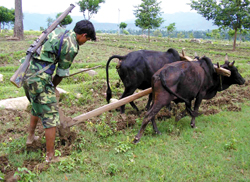|
|
DAILEKH-When the April Uprising rocked the nation earlier this year, and we were raising money for the victims, I called a businessman in Kathmandu and asked for help.
A minister was visiting the businessman and I could hear his voice over the phone. He was shouting: "Forget about it, they'll be finished in a few days." The businessman did not donate any money. In Kathmandu's comfortable core, a lot of people looked at the protestors and said: "Those hooligans are destroying Nepal." They expected the king and the military to regain control and restore the status quo.
If only the king had listened to the people in the countryside, really listened, and not just nodded at those who came to hand him petitions. If he hadn't gone from temple to temple sacrificing goats, he may have known what his people really wanted. Even if he didn't, Tanka Dhakal, Tulsi Giri, and all his other henchmen should have.
Now that the political parties are back in the saddle, from out here in remote Nepal it looks like they are repeating the king's mistake. They hardly ever come here, and in faraway Kathmandu they don't seem to know what the people really want.
And those with guns seem to know even less that the people's aspiration is for peace and to get out from under the shadow of the gun.
For the time being, it may seem that people are afraid of the militants. But fear only lasts so long. In the end, either desperation or hope will overcome the dread of physical harm. The only thing that comes out of the barrel of a gun is fear. If any of the mainstream political parties sent their cadre to a farmer's home and "requested" they "voluntarily" feed 50 people for three days, what would he do? If they went to the schools and ordered the teachers to pay them half their salary, what would they do?
Was the 'People's War' a futile exercise? Was the April Uprising just a rehearsal for darker days? In these villages it used to be that main gates were never closed.
But these days all doors are bolted from inside, lest you hear footsteps in the dead of night and a harsh voice ordering: "Open up, or we will burn your house down." There is no choice here.
Is this the new Nepal of anyone's imagining? The big political parties made many mistakes that they regret. But will the new party, which came with so much hope, also squander it all away? Maybe those creating the "donation terrorism" are Maoists, or maybe just criminals. But what is the difference? Is this what revolution means, to treat the very people you are trying to liberate as your class enemy?
Will the party survive such wholesale alienation when it surfaces into the political arena? I don't think so. If the leaders don't take strong steps to rein in those sowing fear amidst hopes for peace, the people will rise up, as the mothers of this district did three years ago. A revolution is supposed to improve lives, not brutalise the people so they don't trust anyone anymore. Liberation sets people free, it does not paralyse them with fear.
Dr Aruna Uprety is a women's health and reproductive rights activist.




